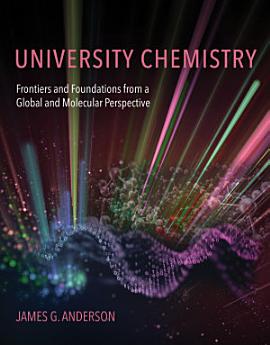University Chemistry: Frontiers and Foundations from a Global and Molecular Perspective
James G. Anderson
Mai 2022 · MIT Press
E-Book
872
Seiten
family_home
Zulässig
info
reportBewertungen und Rezensionen werden nicht geprüft Weitere Informationen
Über dieses E-Book
A new approach to teaching university-level chemistry that links core concepts of chemistry and physical science to current global challenges.
Introductory chemistry and physics are generally taught at the university level as isolated subjects, divorced from any compelling context. Moreover, the “formalism first” teaching approach presents students with disembodied knowledge, abstract and learned by rote. By contrast, this textbook presents a new approach to teaching university-level chemistry that links core concepts of chemistry and physical science to current global challenges. It provides the rigorous development of the principles of chemistry but places these core concepts in a global context to engage developments in technology, energy production and distribution, the irreversible nature of climate change, and national security.
Each chapter opens with a “Framework” section that establishes the topic’s connection to emerging challenges. Next, the “Core” section addresses concepts including the first and second law of thermodynamics, entropy, Gibbs free energy, equilibria, acid-base reactions, electrochemistry, quantum mechanics, molecular bonding, kinetics, and nuclear. Finally, the “Case Studies” section explicitly links the scientific principles to an array of global issues. These case studies are designed to build quantitative reasoning skills, supply the technology background, and illustrate the critical global need for the infusion of technology into energy generation. The text’s rigorous development of both context and scientific principles equips students for advanced classes as well as future involvement in scientific and societal arenas. University Chemistry was written for a widely adopted course created and taught by the author at Harvard.
Introductory chemistry and physics are generally taught at the university level as isolated subjects, divorced from any compelling context. Moreover, the “formalism first” teaching approach presents students with disembodied knowledge, abstract and learned by rote. By contrast, this textbook presents a new approach to teaching university-level chemistry that links core concepts of chemistry and physical science to current global challenges. It provides the rigorous development of the principles of chemistry but places these core concepts in a global context to engage developments in technology, energy production and distribution, the irreversible nature of climate change, and national security.
Each chapter opens with a “Framework” section that establishes the topic’s connection to emerging challenges. Next, the “Core” section addresses concepts including the first and second law of thermodynamics, entropy, Gibbs free energy, equilibria, acid-base reactions, electrochemistry, quantum mechanics, molecular bonding, kinetics, and nuclear. Finally, the “Case Studies” section explicitly links the scientific principles to an array of global issues. These case studies are designed to build quantitative reasoning skills, supply the technology background, and illustrate the critical global need for the infusion of technology into energy generation. The text’s rigorous development of both context and scientific principles equips students for advanced classes as well as future involvement in scientific and societal arenas. University Chemistry was written for a widely adopted course created and taught by the author at Harvard.
Autoren-Profil
James G. Anderson, recipient of the 2021 Dreyfus Prize in Environmental Chemistry, is Philip Weld Professor in the Departments of Chemistry and Chemical Biology, Earth and Planetary Sciences, and the School of Engineering and Applied Sciences at Harvard University.
Dieses E-Book bewerten
Deine Meinung ist gefragt!
Informationen zum Lesen
Smartphones und Tablets
Nachdem du die Google Play Bücher App für Android und iPad/iPhone installiert hast, wird diese automatisch mit deinem Konto synchronisiert, sodass du auch unterwegs online und offline lesen kannst.
Laptops und Computer
Im Webbrowser auf deinem Computer kannst du dir Hörbucher anhören, die du bei Google Play gekauft hast.
E-Reader und andere Geräte
Wenn du Bücher auf E-Ink-Geräten lesen möchtest, beispielsweise auf einem Kobo eReader, lade eine Datei herunter und übertrage sie auf dein Gerät. Eine ausführliche Anleitung zum Übertragen der Dateien auf unterstützte E-Reader findest du in der Hilfe.






